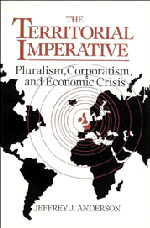Book contents
- Frontmatter
- Contents
- List of figures
- List of tables
- Preface
- 1 Introduction
- 2 Power-dependence and regional economic crisis
- 3 Central governments and regional policy
- 4 The British regions
- 5 The German Länder
- 6 The territorial imperative: Political logic interprets problem logic
- List of abbreviations
- Bibliography
- Index
6 - The territorial imperative: Political logic interprets problem logic
Published online by Cambridge University Press: 26 March 2010
- Frontmatter
- Contents
- List of figures
- List of tables
- Preface
- 1 Introduction
- 2 Power-dependence and regional economic crisis
- 3 Central governments and regional policy
- 4 The British regions
- 5 The German Länder
- 6 The territorial imperative: Political logic interprets problem logic
- List of abbreviations
- Bibliography
- Index
Summary
Rumors of the death of territorial politics are greatly exaggerated. Indeed, politics about territory fought out across territory would appear to be an omnipresent feature of advanced industrial democracies. Equipped with evidence gleaned from the British and German case comparisons, we are now in a position to return to the original questions formulated in Chapter 2. Do the approaches adopted by national and subnational actors combine to produce the predicted patterns of interaction? How can one account for any divergence between actual and predicted outcomes? Whatever the resulting patterns uncovered in the British and German regions, what caused them and what are their political consequences? More importantly, can any regularities in the territorial imperative be traced to the influence of problem and political logics? After these questions have been addressed, the discussion then turns to several broader conceptual issues. A principal objective of this book has been to explore the relative importance of constitutional orders as bona fide institutions. In light of the findings, we need to assess the utility of such a perspective, and to speculate about future lines of research. Finally, we return to mesopolitics and its relative merits as a focus of analysis. To the extent that politics at the mesolevel takes place under a markedly different set of constraints and opportunities than those operative in national politics, do we need to reformulate prevailing ideas in the literature, many of which are based on an exclusive concern with the national level? Are conventional perspectives on British or German politics, or for that matter comparative political economy, in need of revision?
- Type
- Chapter
- Information
- The Territorial ImperativePluralism, Corporatism and Economic Crisis, pp. 187 - 226Publisher: Cambridge University PressPrint publication year: 1992



